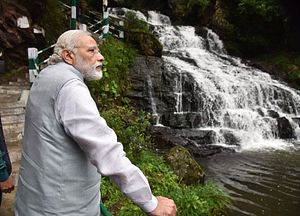Over the past two weeks, India has been defined, shaken, and consumed by the attacks on the Indian Army’s base in Uri, Kashmir, allegedly by Pakistan-based militant attackers. Uri and terrorism have been core themes drawn on by Prime Minister Narendra Modi and his cabinet at all public addresses. The climate in India with respect to Pakistan is extremely volatile and vulnerable today and this is evident in the domestic discussion on Uri.
The Rashtriya Swayamsevak Sangh (RSS), the right-wing parent organization of the ruling party, has explicitly stressed the need for a sustained and planned response to Uri instead of a knee-jerk reaction. While the RSS has not called for a soft stance, they have not explicitly called for retaliation or sought moves toward war either. Instead, their representatives have said that they are happy to throw their weight behind the government’s decision. At the same time, however, RSS leader Mohan Bhagwat has explicitly condemned Pakistan and its anti-India policies.
In the state of Maharashtra, the Navnirman Sena, led by Raj Thackeray, issued an ultimatum two days after the Uri attack, calling on all Pakistani artists to leave India by September 25. In the state of Karnataka, the Vishwa Hindu Parishad (VHP) and the Bajrang Dal filed a complaint against a concert by Pakistani artist Shafqat Amanat Ali. After a series of threats, the concert was ultimately called off.
The rising discontent has also manifested in escalating reactions to various incidents. Vigils and marches have been held in public places as well as in universities. A march in Delhi earlier last week descended into a mob scuffle, culminating in arrests. A Kashmiri student at the Aligarh Muslim University was expelled over allegedly derogatory comments posted on Facebook.
Moreover, social media has been a prime space for airing reactions to India’s approach to Pakistan in the aftermath of the attacks. Prominent actors and cricket players took to Twitter to express both outrage and condolences – with several explicitly condemning Pakistan and calling for strong action. In opinions expressed by these eminent figures online, Pakistan has been called a curse and a hub for terrorists, while others constantly reiterate fear over a perceived lack of preparedness of Indian intelligence.
Across India, much of the onus had been placed upon Modi. The Indian prime minister faced calls to act tough, to make Pakistan pay for Uri, and, above all, to mete out some form of punishment. Polls have broken out in popular discussion – asking whether Modi is tough enough to handle Pakistan and seeking opinions on how India should treat terrorists. While there have been several citizen calls for war in this flammable atmosphere, there is also a significant tempering from certain voices that point out just how much the death toll may increase if India reacts too brashly. On the whole, however, the discussion suggests that citizens have been unsettled to varying degrees by the recent attack.
As the hatred for all things Pakistan seems to be brewing, Modi has attempted to delineate between the Pakistani government and the Pakistani people, condemning just the former for its “export of terrorists.” In his public addresses, improving domestic morale has been identified as an explicit agenda. A parliamentary panel has been deputed to this end, to review border security and internal security capabilities.
On September 29, the Indian Army’s Director General of Military Operations (DGMO) announced at a press conference that India had launched “surgical strikes” along the Line of Control (LoC) between India- and Pakistan-occupied Kashmir. The implications for foreign policy in the wake of this recent retaliation remain to be seen, but the implication domestically is evident in the polarization that unfolded over just a few hours.
Social media has already exploded in jubilation over what is being perceived as a strong Indian response, resulting in the hashtags #ModiPunishesPak and #IndiaStrikesBack. Under these hashtags, the government and the Indian Army have been lauded for their unwillingness to back down and their display of determination. While Pakistan has denied that these surgical strikes even happened, Indian netizens seem to be celebrating them.
The announcement of the strikes has meanwhile created panic in the Kashmir Valley, with television channels discussing war and evacuation even in the absence of any government indications of the same. Hundreds in the Valley rushed home and shops closed earlier than usual last Thursday. Those living closest to the LoC are discussing moving away for a while. Five other states (Delhi, Rajasthan, Maharashtra, Gujarat, and Punjab) have been placed on a high alert in case there are revenge strikes by terror cells.
Meanwhile, singer Atif Aslam’s concert in the city of Gurgaon met a similar fate to Safqat Ali’s. A filmmakers’ body, the Indian Motion Picture Producers’ Association (IMPPA) banned its members from hiring Pakistani actors and artists. At the same time, several Pakistani cinemas have stopped screening Indian films and have blocked the release of new ones. While some Indian actors, prominently Salman Khan, and members of the film industry have spoken out against such bans, arguing for creative exchange, parties like the Shiv Sena have questioned their loyalties and extended threats. Pakistani actors who work in both industries, like Ali Zafar and Fawad Khan, have had their loyalties questioned from both sides.
As the back and forth between the governments over the strikes continues, tension in the subcontinent has palpably risen. There are loud demands to wear nationalism on one’s sleeve and no matter how much Modi attempts to distinguish between Pakistan’s people, its government, and militants, to the citizens they seem to be merging into one entity.
































